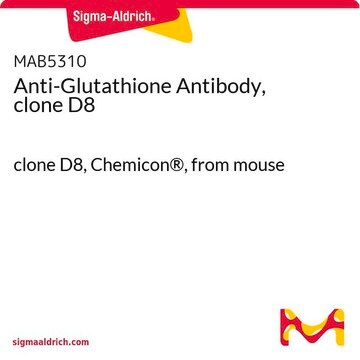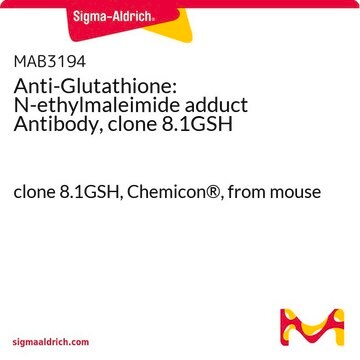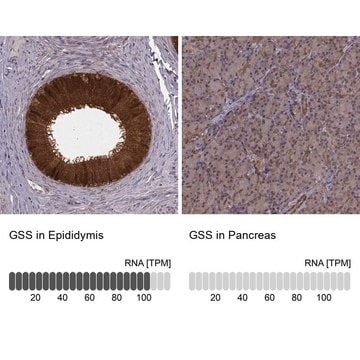AB5010
Anti-Glutathione Antibody, detects both GSH & GSSG
Chemicon®, from rabbit
Se connecterpour consulter vos tarifs contractuels et ceux de votre entreprise/organisme
About This Item
Code UNSPSC :
12352203
eCl@ss :
32160702
Nomenclature NACRES :
NA.41
Produits recommandés
Source biologique
rabbit
Niveau de qualité
Forme d'anticorps
purified immunoglobulin
Type de produit anticorps
primary antibodies
Clone
polyclonal
Espèces réactives
eukaryotes
Fabricant/nom de marque
Chemicon®
Technique(s)
immunohistochemistry: suitable
Conditions d'expédition
wet ice
Modification post-traductionnelle de la cible
unmodified
Informations sur le gène
human ... GSS(2937)
Spécificité
Glutathione. The antibody has been calibrated against a spectrum of antigens to assure hapten selectivity and proper affinity. No measurable glutaraldehyde-fixed tissue cross-reactivity (<1:1000) against L-alanine, g-aminobutyrate, 1-amino-4-guanidobutane (AGB), D/L-arganine, D/L-aspartate, L-citrulline, L-cysteine, D/L-glutamate, D/L-glutamine, glycine, L-lysine, L-ornithine, L-serine, taurine, L-threonine, L-tryptophan, L-tyrosine. Does not discriminate between free GSH and GSSG.
Immunogène
Epitope: detects both GSH & GSSG
Glutathione-glutaraldehyde
Application
Immunohistochemistry using silver-intensified immunogold or enhanced fluorescence methods. Treatment with autofluorescent reducers is typically necessary when using glutaraldehyde fixatives. Samples should be fixed with 0.2% - 2.5% glutaraldehyde for optimum detection. See notes technical notes. This antibody has also been used and found to work with a zero-low glutaraldehyde / high paraformaldehyde fixation (4% paraformaldehyde in 0.1M phosphate buffer / 3% sucrose fixative ). The minimum glutaraldehyde concentration for AB5010 is 0.02%. Performance is good with frozen sections, Vibratome sections and tissue culture formats, when penetrating reagents such as 0.3% Triton X-100 are used (only in blocking buffer, antibody dilution buffer should be in simple TBS or PBS only).
Western blot (Mawatari and Murakami, 2004).
Optimal working dilutions must be determined by the end user.
Note: Glutathione is not osmium tolerant and therefore should not be used for post-embedding electron micoscope immunohistochemistry.
All procedures may be carried out at room temperature. Though the exact dilutions for all applications can not be predicated, it is unlikely that deviations from the calibrated concentration will be needed. The 100X dilution is calibrated to optimize the detection of antigen levels over a 2 log unit range. Greater or lesser dilutions may be employed if unusually high (>20 mM) or low (<0.2 mM) intracellular hapten levels are anticipated or novel specimen conditions exist, such as low glutaraldehyde levels or unusual embedding protocols. Greater dilutions will likely result in decreased maximum signal strength whereas more concentrated solutions will compress the dynamic range of detection.
TECHNICAL NOTES
The AB5010 is optimized for use with immunogold or fluorescence detection. Visualization with enzyme-linked methods can be used but they typically compress the dynamic range of detection. Use of high gain methods such as tyramides will require the user to perform independent calibrations. Use with frozen sections is possible but will not yield optimal images as IgGs will penetrate aldehyde cross-linked tissue poorly and most amino acids are present at such high levels that prozone effect occurs. Use in whole mount or vibratome sections is not recommended for similar reasons.
Western blot (Mawatari and Murakami, 2004).
Optimal working dilutions must be determined by the end user.
Note: Glutathione is not osmium tolerant and therefore should not be used for post-embedding electron micoscope immunohistochemistry.
All procedures may be carried out at room temperature. Though the exact dilutions for all applications can not be predicated, it is unlikely that deviations from the calibrated concentration will be needed. The 100X dilution is calibrated to optimize the detection of antigen levels over a 2 log unit range. Greater or lesser dilutions may be employed if unusually high (>20 mM) or low (<0.2 mM) intracellular hapten levels are anticipated or novel specimen conditions exist, such as low glutaraldehyde levels or unusual embedding protocols. Greater dilutions will likely result in decreased maximum signal strength whereas more concentrated solutions will compress the dynamic range of detection.
TECHNICAL NOTES
The AB5010 is optimized for use with immunogold or fluorescence detection. Visualization with enzyme-linked methods can be used but they typically compress the dynamic range of detection. Use of high gain methods such as tyramides will require the user to perform independent calibrations. Use with frozen sections is possible but will not yield optimal images as IgGs will penetrate aldehyde cross-linked tissue poorly and most amino acids are present at such high levels that prozone effect occurs. Use in whole mount or vibratome sections is not recommended for similar reasons.
Research Category
Neuroscience
Neuroscience
Research Sub Category
Oxidative Stress
Oxidative Stress
This Anti-Glutathione Antibody, detects both GSH & GSSG is validated for use in IH for the detection of Glutathione.
Conditionnement
sufficient for 2000 assays
Forme physique
Format: Purified
IgG fraction in sterile 0.1M phosphate buffer. No preservative
Stockage et stabilité
Maintain stock at 2-8°C in undiluted aliquots for up to 6 months. This stock is extremely stable under normal use and routine storage at 2-8°C. Do not refreeze this stock.
Informations légales
CHEMICON is a registered trademark of Merck KGaA, Darmstadt, Germany
Clause de non-responsabilité
Unless otherwise stated in our catalog or other company documentation accompanying the product(s), our products are intended for research use only and are not to be used for any other purpose, which includes but is not limited to, unauthorized commercial uses, in vitro diagnostic uses, ex vivo or in vivo therapeutic uses or any type of consumption or application to humans or animals.
Not finding the right product?
Try our Outil de sélection de produits.
Certificats d'analyse (COA)
Recherchez un Certificats d'analyse (COA) en saisissant le numéro de lot du produit. Les numéros de lot figurent sur l'étiquette du produit après les mots "Lot" ou "Batch".
Déjà en possession de ce produit ?
Retrouvez la documentation relative aux produits que vous avez récemment achetés dans la Bibliothèque de documents.
Jie Yang et al.
The Journal of biological chemistry, 295(24), 8302-8324 (2020-04-26)
Heat shock protein 70 (Hsp70) proteins are a family of ancient and conserved chaperones. Cysteine modifications have been widely detected among different Hsp70 family members in vivo, but their effects on Hsp70 structure and function are unclear. Here, we treated
Katarzyna Otulak-Kozieł et al.
International journal of molecular sciences, 23(19) (2022-10-15)
Plants produce glutathione as a response to the intercellular redox state. Glutathione actively participates in the reactive oxygen species (ROS)-dependent signaling pathway, especially under biotic stress conditions. Most of the glutathione S-transferases (GSTs) are induced in cells during the defense
Glutathione Contribution in Interactions between Turnip mosaic virus and Arabidopsis thaliana Mutants Lacking Respiratory Burst Oxidase Homologs D and F.
Otulak-Kozie??, et al.
International Journal of Molecular Sciences, 24 (2023)
Zhouping Hong et al.
The Journal of biological chemistry, 299(1), 102723-102723 (2022-11-22)
Hsp70s are multifunctional proteins and serve as the central hub of the protein quality control network. Hsp70s are also related to a number of diseases and have been established as drug targets. Human HspA1A (hHsp70) and HspA8 (hHsc70) are the
Single-cell redox imaging demonstrates a distinctive response of dopaminergic neurons to oxidative insults.
Horowitz, MP; Milanese, C; Di Maio, R; Hu, X; Montero, LM; Sanders, LH; Tapias, V; Sepe et al.
Antioxidants & Redox Signaling null
Notre équipe de scientifiques dispose d'une expérience dans tous les secteurs de la recherche, notamment en sciences de la vie, science des matériaux, synthèse chimique, chromatographie, analyse et dans de nombreux autres domaines..
Contacter notre Service technique






